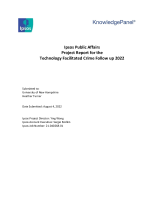Public opinion
Informal Control of Crime Through Neighborhood Networks
Helicopters and Their Use in Police and Pursuit: Attachments: Public Opinion Survey Breakdown of Attitudes by Demographic Data
Sources of Data That Identify and Measure the Impacts of Organized Crime
Research, Evaluation, and Analysis of Call Handling on Three-Digit Hotlines (REACH-3D)
Anti-Immigration Sentiment and Public Opinion on Human Trafficking
Culture of Corruption: Prosecutions, Persistence, and Desistence
Technology Facilitated Crime Follow-up 2022
Perceptions of White-Collar Crime Seriousness: Unpacking and Translating Attitudes into Policy Preferences
Fractal analysis of fingerprints
Using Administrative and Survey Data to Evaluate the Impact of Changing Marijuana Laws and Policies on Marijuana Use, Treatment Admissions for Marijuana, and Mortality Related to Marijuana and Other Drug Use
National Symposium on Sentencing--The Judicial Response to Crime: Instructor's Guide for Classroom Video
Crime frames and gender differences in the activation of crime concern and crime responses
On Immigration and Crime
End of an Era? Understanding the Contradictions of Criminal Justice Reform
Crime and Justice: A Review of Research, Volume 27
Reactions of Oklahoma City Bombing Survivors to Media Coverage of the September 11, 2001, Attacks
Bending Towards Justice: Perceptions of Justice among Human Trafficking Survivors
Community Policing Against Guns: Public Opinion of the Kansas City Gun Experiment
Measuring Procedural Justice and Legitimacy at the Local Level: the Police-Community Interaction Survey
Craniofacial Morphometric Analysis of Individuals with X-linked Hypohidrotic Ectodermal Dysplasia
Street Stops and Police Legitimacy: Teachable Moments in Young Urban Men's Legal Socialization
Citizen Complaints as Threats to Police Legitimacy: The Role of Officers' Occupational Attitudes
Less Prison, More Police, Less Crime: How Criminology Can Save the States from Bankruptcy
Professor Lawrence Sherman explains how policing can prevent far more crimes than prison per dollar spent. His analysis of the cost-effectiveness of prison compared to policing suggests that states can cut their total budgets for justice and reduce crime by reallocating their spending on crime: less prison, more police.
See the YouTube Terms of Service and Google Privacy Policy
From the Academy to Retirement: A Journey Through the Policing Lifecycle
Professor Rosenbaum and a panel of colleagues discuss a study to demonstrate the feasibility of creating a foundation from which to launch studies about multiple aspects of policing using standardized definitions and measurement tools. Their goal is to advance knowledge about policing and translate data into evidence-based best practices that improve training, supervision and accountability systems. The effort is expected to produce a better understanding of what motivates police officers and makes them healthier, happier and more effective.
See the YouTube Terms of Service and Google Privacy Policy



